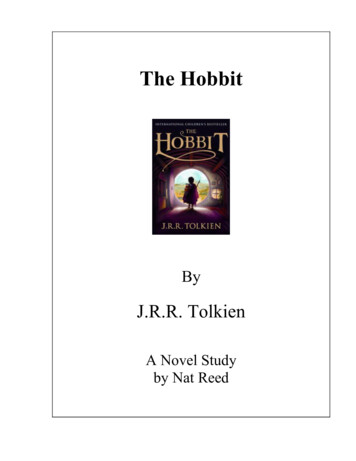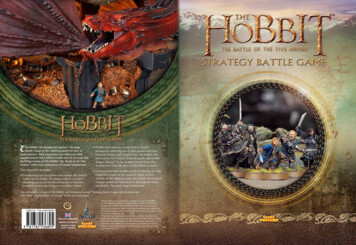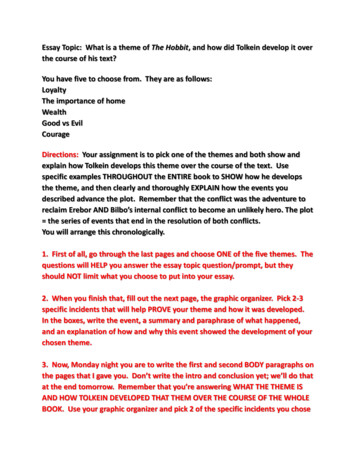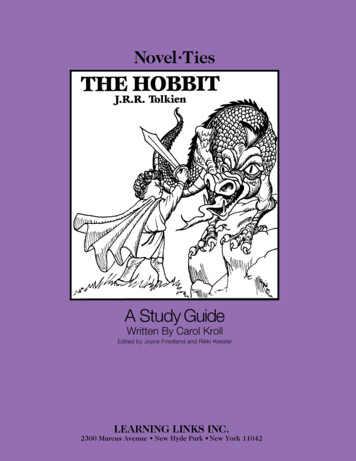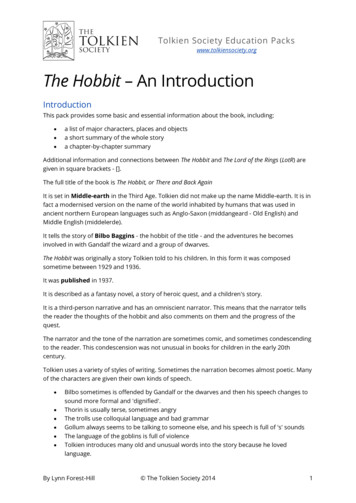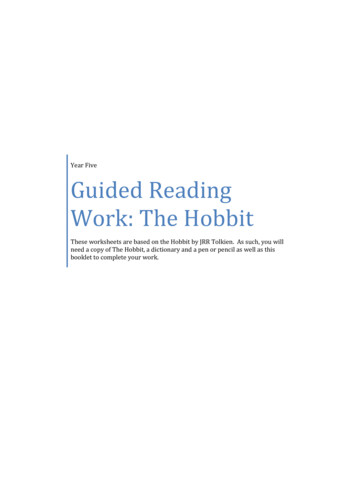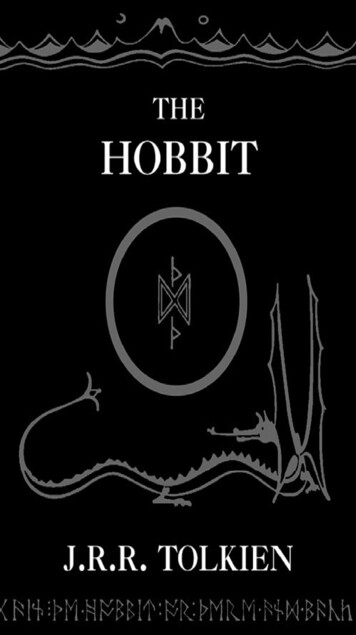
Transcription
THE HOBBITORTHERE AND BACK AGAINBYJ.R.R. TOLKIEN
The Hobbit is a tale of high adventure, undertaken by acompany of dwarves, in search of dragon-guarded gold.A reluctant partner in this perilous quest is Bilbo Baggins,a comfort-loving, unambitious hobbit, who surprises evenhimself by his resourcefulness and his skill as a burglar.Encounters with trolls, goblins, dwarves, elves andgiant spiders, conversations with the dragon, Smaug theMagnificent, and a rather unwilling presence at the Battleof the Five Armies are some of the adventures that befallBilbo. But there are lighter moments as well: goodfellowship, welcome meals, laughter and song.Bilbo Baggins has taken his place among the ranks ofthe immortals of children’s fiction. Written for ProfessorTolkien’s own children, The Hobbit met with instantacclaim when published. It is a complete and marvelloustale in itself, but it also forms a prelude to The Lord of theRings.‘One of the most influential books of our generation’The Times
CONTENTSCOVER PAGETITLE PAGELIST OF ILLUSTRATIONSNOTE ON THE TEXTAUTHOR’S NOTECHAPTER I: AN UNEXPECTED PARTYCHAPTER II: ROAST MUTTONCHAPTER III: A SHORT RESTCHAPTER IV: OVER HILL AND UNDER HILLCHAPTER V: RIDDLES IN THE DARKCHAPTER VI: OUT OF THE FRYING-PAN INTO THEFIRECHAPTER VII: QUEER LODGINGSCHAPTER VIII: FLIES AND SPIDERSCHAPTER IX: BARRELS OUT OF BOND
CHAPTER X: A WARM WELCOMECHAPTER XI: ON THE DOORSTEPCHAPTER XII: INSIDE INFORMATIONCHAPTER XIII: NOT AT HOMECHAPTER XIV: FIRE AND WATERCHAPTER XV: THE GATHERING OF THE CLOUDSCHAPTER XVI: A THIEF IN THE NIGHTCHAPTER XVII: THE CLOUDS BURSTCHAPTER XVIII: THE RETURN JOURNEYCHAPTER XIX: THE LAST STAGEWORKS BY J.R.R. TOLKIENCOPYRIGHTABOUT THE PUBLISHER
ILLUSTRATIONSThror’s MapThe TrollsThe Mountain-pathThe Misty Mountains looking WestBeorn’s HallThe Elvenking’s GateLake TownThe Front GateThe Hall at Bag-EndMap of Wilderland
NOTE ON THE TEXTThe Hobbit was first published in September 1937. Its1951 second edition (fifth impression) contains asignificantly revised portion of Chapter V, “Riddles in theDark,” which brings the story of The Hobbit more in linewith its sequel, The Lord of the Rings, then in progress.Tolkien made some further revisions to the Americanedition published by Ballantine Books in February 1966,and to the British third edition (sixteenth impression)published by George Allen & Unwin later that same year.For the 1995 British hardcover edition, published byHarperCollins, the text of The Hobbit was entered intoword-processing files, and a number of furthercorrections of misprints and errors were made. Sincethen, various editions of The Hobbit have been generatedfrom that computerized text file. For the present text, thatfile has been compared again, line by line, with the earliereditions, and a number of further corrections have beenmade to present a text that, as closely as possible,represents Tolkien’s final intended form.Readers interested in details of the changes made atvarious times to the text of The Hobbit are referred toAppendix A, “Textual and Revisional Notes,” of TheAnnotated Hobbit (1988), and J. R. R. Tolkien: ADescriptive Bibliography by Wayne G. Hammond, withthe assistance of Douglas A. Anderson (1993).Douglas A. AndersonMay 2001
Author's NoteThis is a story of long ago. At that time the languages andletters were quite different from ours of today. English isused to represent the languages. But two points may benoted. (1) In English the only correct plural of dwarf isdwarfs, and the adjective is dwarfish. In this storydwarves and dwarvish are used*, but only when speakingof the ancient people to whom Thorin Oakenshield andhis companions belonged. (2) Orc is not an English word.It occurs in one or two places but is usually translatedgoblin (or hobgoblin for the larger kinds). Orc is thehobbits’ form of the name given at that time to thesecreatures, and it is not connected at all with our orc, ork,applied to sea-animals of dolphin-kind.Runes were old letters originally used for cutting orscratching on wood, stone, or metal, and so were thin andangular. At the time of this tale only the Dwarves maderegular use of them, especially for private or secretrecords. Their runes are in this book represented byEnglish runes, which are known now to few people. If the
runes on Thror’s Map are compared with thetranscriptions into modern letters† †, the alphabet,adapted to modern English, can be discovered and theabove runic title also read. On the Map all the normalrunes are found, exceptfor X. I and U are used for Jand V. There was no rune for Q (use CW); nor for Z (thedwarf-runemay be used if required). It will be found,however, that some single runes stand for two modernletters: th, ng, ee; other runes of the same kind (eaandst) were also sometimes used. The secret doorwas marked D . From the side a hand pointed to this,andunderitwaswritten:The last Two runes are the initials of Thror and Thrain.Themoon-runesreadbyElrondwere:On the Map the compass points are marked in runes,with East at the top, as usual in dwarf-maps, and so readclockwise: E(ast), S(outh), W(est), N(orth).
Chapter IAN UNEXPECTED PARTYIn a hole in the ground there lived a hobbit. Not a nasty,dirty, wet hole, filled with the ends of worms and an oozysmell, nor yet a dry, bare, sandy hole with nothing in it tosit down on or to eat: it was a hobbit-hole, and that meanscomfort.It had a perfectly round door like a porthole, paintedgreen, with a shiny yellow brass knob in the exact middle.The door opened on to a tube-shaped hall like a tunnel: avery comfortable tunnel without smoke, with panelledwalls, and floors tiled and carpeted, provided withpolished chairs, and lots and lots of pegs for hats andcoats—the hobbit was fond of visitors. The tunnel woundon and on, going fairly but not quite straight into the sideof the hill—The Hill, as all the people for many milesround called it—and many little round doors opened outof it, first on one side and then on another. No goingupstairs for the hobbit: bedrooms, bathrooms, cellars,pantries (lots of these), wardrobes (he had whole roomsdevoted to clothes), kitchens, dining-rooms, all were onthe same floor, and indeed on the same passage. The bestrooms were all on the left-hand side (going in), for thesewere the only ones to have windows, deep-set roundwindows looking over his garden, and meadows beyond,
sloping down to the river.This hobbit was a very well-to-do hobbit, and his namewas Baggins. The Bagginses had lived in theneighbourhood of The Hill for time out of mind, andpeople considered them very respectable, not onlybecause most of them were rich, but also because theynever had any adventures or did anything unexpected:you could tell what a Baggins would say on any questionwithout the bother of asking him. This is a story of how aBaggins had an adventure, and found himself doing andsaying things altogether unexpected. He may have lost theneighbours’ respect, but he gained—well, you will seewhether he gained anything in the end.The mother of our particular hobbit—what is a hobbit?I suppose hobbits need some description nowadays, sincethey have become rare and shy of the Big People, as theycall us. They are (or were) a little people, about half ourheight, and smaller than the bearded Dwarves. Hobbitshave no beards. There is little or no magic about them,except the ordinary everyday sort which helps them todisappear quietly and quickly when large stupid folk likeyou and me come blundering along, making a noise likeelephants which they can hear a mile off. They areinclined to be fat in the stomach; they dress in brightcolours (chiefly green and yellow); wear no shoes,because their feet grow natural leathery soles and thickwarm brown hair like the stuff on their heads (which iscurly); have long clever brown fingers, good-naturedfaces, and laugh deep fruity laughs (especially afterdinner, which they have twice a day when they can get it).Now you know enough to go on with. As I was saying,the mother of this hobbit—of Bilbo Baggins, that is—wasthe famous Belladonna Took, one of the three remarkabledaughters of the Old Took, head of the hobbits who livedacross The Water, the small river that ran at the foot ofThe Hill. It was often said (in other families) that longago one of the Took ancestors must have taken a fairywife. That was, of course, absurd, but certainly there was
still something not entirely hobbitlike about them, andonce in a while members of the Took-clan would go andhave adventures. They discreetly disappeared, and thefamily hushed it up; but the fact remained that the Tookswere not as respectable as the Bagginses, though theywere undoubtedly richer.Not that Belladonna Took ever had any adventuresafter she became Mrs. Bungo Baggins. Bungo, that wasBilbo’s father, built the most luxurious hobbit-hole forher (and partly with her money) that was to be foundeither under The Hill or over The Hill or across TheWater, and there they remained to the end of their days.Still it is probable that Bilbo, her only son, although helooked and behaved exactly like a second edition of hissolid and comfortable father, got something a bit queer inhis make-up from the Took side, something that onlywaited for a chance to come out. The chance neverarrived, until Bilbo Baggins was grown up, being aboutfifty years old or so, and living in the beautiful hobbithole built by his father, which I have just described foryou, until he had in fact apparently settled downimmovably.By some curious chance one morning long ago in thequiet of the world, when there was less noise and moregreen, and the hobbits were still numerous andprosperous, and Bilbo Baggins was standing at his doorafter breakfast smoking an enormous long wooden pipethat reached nearly down to his woolly toes (neatlybrushed)—Gandalf came by. Gandalf! If you had heardonly a quarter of what I have heard about him, and I haveonly heard very little of all there is to hear, you would beprepared for any sort of remarkable tale. Tales andadventures sprouted up all over the place wherever hewent, in the most extraordinary fashion. He had not beendown that way under The Hill for ages and ages, not sincehis friend the Old Took died, in fact, and the hobbits hadalmost forgotten what he looked like. He had been awayover The Hill and across The Water on businesses of his
own since they were all small hobbit-boys and hobbitgirls.All that the unsuspecting Bilbo saw that morning wasan old man with a staff. He had a tall pointed blue hat, along grey cloak, a silver scarf over which his long whitebeard hung down below his waist, and immense blackboots.“Good Morning!” said Bilbo, and he meant it. The sunwas shining, and the grass was very green. But Gandalflooked at him from under long bushy eyebrows that stuckout further than the brim of his shady hat.“What do you mean?” he said. “Do you wish me agood morning, or mean that it is a good morning whetherI want it or not; or that you feel good this morning; or thatit is a morning to be good on?”“All of them at once,” said Bilbo. “And a very finemorning for a pipe of tobacco out of doors, into thebargain. If you have a pipe about you, sit down and havea fill of mine! There’s no hurry, we have all the daybefore us!” Then Bilbo sat down on a seat by his door,crossed his legs, and blew out a beautiful grey ring ofsmoke that sailed up into the air without breaking andfloated away over The Hill.“Very pretty!” said Gandalf. “But I have no time toblow smoke-rings this morning. I am looking forsomeone to share in an adventure that I am arranging, andit’s very difficult to find anyone.”“I should think so—in these parts! We are plain quietfolk and have no use for adventures. Nasty disturbinguncomfortable things! Make you late for dinner! I can’tthink what anybody sees in them,” said our Mr. Baggins,and stuck one thumb behind his braces, and blew outanother even bigger smokering. Then he took out hismorning letters, and began to read, pretending to take nomore notice of the old man. He had decided that he wasnot quite his sort, and wanted him to go away. But the oldman did not move. He stood leaning on his stick andgazing at the hobbit without saying anything, till Bilbo
got quite uncomfortable and even a little cross.“Good morning!” he said at last. “We don’t want anyadventures here, thank you! You might try over The Hillor across The Water.” By this he meant that theconversation was at an end.“What a lot of things you do use Good morning for!”said Gandalf. “Now you mean that you want to get rid ofme, and that it won’t be good till I move off.”“Not at all, not at all, my dear sir! Let me see, I don’tthink I know your name?”“Yes, yes, my dear sir—and I do know your name, Mr.Bilbo Baggins. And you do know my name, though youdon’t remember that I belong to it. I am Gandalf, andGandalf means me! To think that I should have lived tobe good-morninged by Belladonna Took’s son, as if I wasselling buttons at the door!”“Gandalf, Gandalf! Good gracious me! Not thewandering wizard that gave Old Took a pair of magicdiamond studs that fastened themselves and never cameundone till ordered? Not the fellow who used to tell suchwonderful tales at parties, about dragons and goblins andgiants and the rescue of princesses and the unexpectedluck of widows’ sons? Not the man that used to makesuch particularly excellent fireworks! I remember those!Old Took used to have them on Midsummer’s Eve.Splendid! They used to go up like great lilies andsnapdragons and laburnums of fire and hang in thetwilight all evening!” You will notice already that Mr.Baggins was not quite so prosy as he liked to believe, alsothat he was very fond of flowers. “Dear me!” he went on.“Not the Gandalf who was responsible for so many quietlads and lasses going off into the Blue for madadventures? Anything from climbing trees to visitingelves—or sailing in ships, sailing to other shores! Blessme, life used to be quite inter—I mean, you used to upsetthings badly in these parts once upon a time. I beg yourpardon, but I had no idea you were still in business.”“Where else should I be?” said the wizard. “All the
same I am pleased to find you remember something aboutme. You seem to remember my fireworks kindly, at anyrate, and that is not without hope. Indeed for your oldgrandfather Took’s sake, and for the sake of poorBelladonna, I will give you what you asked for.”“I beg your pardon, I haven’t asked for anything!”“Yes, you have! Twice now. My pardon. I give it you.In fact I will go so far as to send you on this adventure.Very amusing for me, very good for you—and profitabletoo, very likely, if you ever get over it.”“Sorry! I don’t want any adventures, thank you. Nottoday. Good morning! But please come to tea—any timeyou like! Why not tomorrow? Come tomorrow! Goodbye!” With that the hobbit turned and scuttled inside hisround green door, and shut it as quickly as he dared, notto seem rude. Wizards after all are wizards.“What on earth did I ask him to tea for!” he said tohimself, as he went to the pantry. He had only just hadbreakfast, but he thought a cake or two and a drink ofsomething would do him good after his fright.Gandalf in the meantime was still standing outside thedoor, and laughing long but quietly. After a while hestepped up, and with the spike on his staff scratched aqueer sign on the hobbit’s beautiful green front-door.Then he strode away, just about the time when Bilbo wasfinishing his second cake and beginning to think that hehad escaped adventures very well.The next day he had almost forgotten about Gandalf.He did not remember things very well, unless he put themdown on his Engagement Tablet: like this: Gandalf TeaWednesday. Yesterday he had been too flustered to doanything of the kind.Just before tea-time there came a tremendous ring onthe front-door bell, and then he remembered! He rushedand put on the kettle, and put out another cup and saucer,and an extra cake or two, and ran to the door.“I am so sorry to keep you waiting!” he was going tosay, when he saw that it was not Gandalf at all. It was a
dwarf with a blue beard tucked into a golden belt, andvery bright eyes under his dark-green hood. As soon asthe door was opened, he pushed inside, just as if he hadbeen expected.He hung his hooded cloak on the nearest peg, and“Dwalin at your service!” he said with a low bow.“Bilbo Baggins at yours!” said the hobbit, too surprisedto ask any questions for the moment. When the silencethat followed had become uncomfortable, he added: “I amjust about to take tea; pray come and have some withme.” A little stiff perhaps, but he meant it kindly. Andwhat would you do, if an uninvited dwarf came and hunghis things up in your hall without a word of explanation?They had not been at table long, in fact they had hardlyreached the third cake, when there came another evenlouder ring at the bell.“Excuse me!” said the hobbit, and off he went to thedoor.“So you have got here at last!” That was what he wasgoing to say to Gandalf this time. But it was not Gandalf.Instead there was a very old-looking dwarf on the stepwith a white beard and a scarlet hood; and he too hoppedinside as soon as the door was open, just as if he had beeninvited.“I see they have begun to arrive already,” he said whenhe caught sight of Dwalin’s green hood hanging up. Hehung his red one next to it, and “Balin at your service!”he said with his hand on his breast.“Thank you!” said Bilbo with a gasp. It was not thecorrect thing to say, but they have begun to arrive hadflustered him badly. He liked visitors, but he liked toknow them before they arrived, and he preferred to askthem himself. He had a horrible thought that the cakesmight run short, and then he—as the host: he knew hisduty and stuck to it however painful—he might have togo without.“Come along in, and have some tea!” he managed tosay after taking a deep breath.
“A little beer would suit me better, if it is all the sameto you, my good sir,” said Balin with the white beard.“But I don’t mind some cake—seed-cake, if you haveany.”“Lots!” Bilbo found himself answering, to his ownsurprise; and he found himself scuttling off, too, to thecellar to fill a pint beer-mug, and then to a pantry to fetchtwo beautiful round seed-cakes which he had baked thatafternoon for his after-supper morsel.When he got back Balin and Dwalin were talking at thetable like old friends (as a matter of fact they werebrothers). Bilbo plumped down the beer and the cake infront of them, when loud came a ring at the bell again,and then another ring.“Gandalf for certain this time,” he thought as he puffedalong the passage. But it was not. It was two moredwarves, both with blue hoods, silver belts, and yellowbeards; and each of them carried a bag of tools and aspade. In they hopped, as soon as the door began to open—Bilbo was hardly surprised at all.“What can I do for you, my dwarves?” he said.“Kili at your service!” said the one. “And Fili!” addedthe other; and they both swept off their blue hoods andbowed.“At yours and your family’s!” replied Bilbo,remembering his manners this time.“Dwalin and Balin here already, I see,” said Kili. “Letus join the throng!”“Throng!” thought Mr. Baggins. “I don’t like the soundof that. I really must sit down for a minute and collect mywits, and have a drink.” He had only just had a sip—inthe corner, while the four dwarves sat round the table, andtalked about mines and gold and troubles with thegoblins, and the depredations of dragons, and lots of otherthings which he did not understand, and did not want to,for they sounded much too adventurous—when, dingdong-a-ling-dang, his bell rang again, as if some naughtylittle hobbit-boy was trying to pull the handle off.
“Someone at the door!” he said, blinking.“Some four, I should say by the sound,” said Fili.“Besides, we saw them coming along behind us in thedistance.”The poor little hobbit sat down in the hall and put hishead in his hands, and wondered what had happened, andwhat was going to happen, and whether they would allstay to supper. Then the bell rang again louder than ever,and he had to run to the door. It was not four after all, itwas five. Another dwarf had come along while he waswondering in the hall. He had hardly turned the knob,before they were all inside, bowing and saying “at yourservice” one after another. Dori, Nori, Ori, Oin, and Gloinwere their names; and very soon two purple hoods, a greyhood, a brown hood, and a white hood were hanging onthe pegs, and off they marched with their broad handsstuck in their gold and silver belts to join the others.Already it had almost become a throng. Some called forale, and some for porter, and one for coffee, and all ofthem for cakes; so the hobbit was kept very busy for awhile.A big jug of coffee had just been set in the hearth, theseed-cakes were gone, and the dwarves were starting on around of buttered scones, when there came—a loudknock. Not a ring, but a hard rat-tat on the hobbit’sbeautiful green door. Somebody was banging with astick!Bilbo rushed along the passage, very angry, andaltogether bewildered and bewuthered—this was the mostawkward Wednesday he ever remembered. He pulledopen the door with a jerk, and they all fell in, one on topof the other. More dwarves, four more! And there wasGandalf behind, leaning on his staff and laughing. He hadmade quite a dent on the beautiful door; he had also, bythe way, knocked out the secret mark that he had putthere the morning before.“Carefully! Carefully!” he said. “It is not like you,Bilbo, to keep friends waiting on the mat, and then open
the door like a pop-gun! Let me introduce Bifur, Bofur,Bombur, and especially Thorin!”“At your service!” said Bifur, Bofur, and Bomburstanding in a row. Then they hung up two yellow hoodsand a pale green one; and also a sky-blue one with a longsilver tassel. This last belonged to Thorin, an enormouslyimportant dwarf, in fact no other than the great ThorinOakenshield himself, who was not at all pleased at fallingflat on Bilbo’s mat with Bifur, Bofur, and Bombur on topof him. For one thing Bombur was immensely fat andheavy. Thorin indeed was very haughty, and said nothingabout service; but poor Mr. Baggins said he was sorry somany times, that at last he grunted “pray don’t mentionit,” and stopped frowning.“Now we are all here!” said Gandalf, looking at therow of thirteen hoods—the best detachable party hoods—and his own hat hanging on the pegs. “Quite a merrygathering! I hope there is something left for the latecomers to eat and drink! What’s that? Tea! No thank you!A little red wine, I think for me.”“And for me,” said Thorin.“And raspberry jam and apple-tart,” said Bifur.“And mince-pies and cheese,” said Bofur.“And pork-pie and salad,” said Bombur.“And more cakes—and ale—and coffee, if you don’tmind,” called the other dwarves through the door.“Put on a few eggs, there’s a good fellow!” Gandalfcalled after him, as the hobbit stumped off to the pantries.“And just bring out the cold chicken and pickles!”“Seems to know as much about the inside of my lardersas I do myself!” thought Mr. Baggins, who was feelingpositively flummoxed, and was beginning to wonderwhether a most wretched adventure had not come rightinto his house. By the time he had got all the bottles anddishes and knives and forks and glasses and plates andspoons and things piled up on big trays, he was gettingvery hot, and red in the face, and annoyed.“Confusticate and bebother these dwarves!” he said
aloud. “Why don’t they come and lend a hand?” Lo andbehold! there stood Balin and Dwalin at the door of thekitchen, and Fili and Kili behind them, and before hecould say knife they had whisked the trays and a couple ofsmall tables into the parlour and set out everything afresh.Gandalf sat at the head of the party with the thirteendwarves all round: and Bilbo sat on a stool at the fireside,nibbling at a biscuit (his appetite was quite taken away),and trying to look as if this was all perfectly ordinary andnot in the least an adventure. The dwarves ate and ate,and talked and talked, and time got on. At last theypushed their chairs back, and Bilbo made a move tocollect the plates and glasses.“I suppose you will all stay to supper?” he said in hispolitest unpressing tones.“Of course!” said Thorin. “And after. We shan’t getthrough the business till late, and we must have somemusic first. Now to clear up!”Thereupon the twelve dwarves—not Thorin, he wastoo important, and stayed talking to Gandalf—jumped totheir feet, and made tall piles of all the things. Off theywent, not waiting for trays, balancing columns of plates,each with a bottle on the top, with one hand, while thehobbit ran after them almost squeaking with fright:“please be careful!” and “please, don’t trouble! I canmanage.” But the dwarves only started to sing:Chip the glasses and crack the plates!Blunt the knives and bend the forks!That’s what Bilbo Baggins hates–Smash the bottles and burn the corks!Cut the cloth and tread on the fat!Pour the milk on the pantry floor!Leave the bones on the bedroom mat!Splash the wine on every door!
Dump the crocks in a boiling bowl;Pound them up with a thumping pole;And when you’ve finished, if any are whole,Send them down the hall to roll!That’s what Bilbo Baggins hates!So, carefully! carefully with the plates!And of course they did none of these dreadful things,and everything was cleaned and put away safe as quick aslightning, while the hobbit was turning round and roundin the middle of the kitchen trying to see what they weredoing. Then they went back, and found Thorin with hisfeet on the fender smoking a pipe. He was blowing themost enormous smoke-rings, and wherever he told one togo, it went—up the chimney, or behind the clock on themantelpiece, or under the table, or round and round theceiling; but wherever it went it was not quick enough toescape Gandalf. Pop! he sent a smaller smoke-ring fromhis short clay-pipe straight through each one of Thorin’s.Then Gandalf’s smoke-ring would go green and comeback to hover over the wizard’s head. He had a cloud ofthem about him already, and in the dim light it made himlook strange and sorcerous. Bilbo stood still and watched—he loved smoke-rings—and then he blushed to thinkhow proud he had been yesterday morning of the smokerings he had sent up the wind over The Hill.“Now for some music!” said Thorin. “Bring out theinstruments!”Kili and Fili rushed for their bags and brought backlittle fiddles; Dori, Nori, and Ori brought out flutes fromsomewhere inside their coats; Bombur produced a drumfrom the hall; Bifur and Bofur went out too, and cameback with clarinets that they had left among the walkingsticks. Dwalin and Balin said: “Excuse me, I left mine inthe porch!” “Just bring mine in with you!” said Thorin.
They came back with viols as big as themselves, and withThorin’s harp wrapped in a green cloth. It was a beautifulgolden harp, and when Thorin struck it the music beganall at once, so sudden and sweet that Bilbo forgoteverything else, and was swept away into dark landsunder strange moons, far over The Water and very farfrom his hobbit-hole under The Hill.The dark came into the room from the little windowthat opened in the side of The Hill; the firelight flickered—it was April—and still they played on, while theshadow of Gandalf’s beard wagged against the wall.The dark filled all the room, and the fire died down,and the shadows were lost, and still they played on. Andsuddenly first one and then another began to sing as theyplayed, deep-throated singing of the dwarves in the deepplaces of their ancient homes; and this is like a fragmentof their song, if it can be like their song without theirmusic.Far over the misty mountains coldTo dungeons deep and caverns oldWe must away ere break of dayTo seek the pale enchanted gold.The dwarves of yore made mighty spells,While hammers fell like ringing bellsIn places deep, where dark things sleep,In hollow halls beneath the fells.For ancient king and elvish lordThere many a gleaming golden hoardThey shaped and wrought, and light they caughtTo hide in gems on hilt of sword.On silver necklaces they strung
The flowering stars, on crowns they hungThe dragon-fire, in twisted wireThey meshed the light of moon and sun.Far over the misty mountains coldTo dungeons deep and caverns oldWe must away, ere break of day,To claim our long-forgotten gold.Goblets they carved there for themselvesAnd harps of gold; where no man delvesThere lay they long, and many a songWas sung unheard by men or elves.The pines were roaring on the height,The winds were moaning in the night.The fire was red, it flaming spread;The trees like torches blazed with light.The bells were ringing in the daleAnd men looked up with faces pale;The dragon’s ire more fierce than fireLaid low their towers and houses frail.The mountain smoked beneath the moon;The dwarves, they heard the tramp of doom.They fled their hall to dying fallBeneath his feet, beneath the moon.Far over the misty mountains grimTo dungeons deep and caverns dimWe must away, ere break of day,To win our harps and gold from him!
As they sang the hobbit felt the love of beautiful thingsmade by hands and by cunning and by magic movingthrough him, a fierce and a jealous love, the desire of thehearts of dwarves. Then something Tookish woke upinside him, and he wished to go and see the greatmountains, and hear the pine-trees and the waterfalls, andexplore the caves, and wear a sword instead of a walkingstick. He looked out of the window. The stars were out ina dark sky above the trees. He thought of the jewels of thedwarves shining in dark caverns. Suddenly in the woodbeyond The Water a flame leapt up—probably somebodylighting a wood-fire—and he thought of plunderingdragons settling on his quiet Hill and kindling it all toflames. He shuddered; and very quickly he was plain Mr.Baggins of Bag-End, Under-Hill, again.He got up t
The Hobbit is a tale of high adventure, undertaken by a company of dwarves, in search of dragon-guarded gold. A reluctant partner in this perilous quest is Bilbo Baggins, a comfort-loving, unambitious hobbit, who surprises even himself by his resourcefulness and his skill as a burglar. Encounters with trolls, goblins, dwarves, elves and


